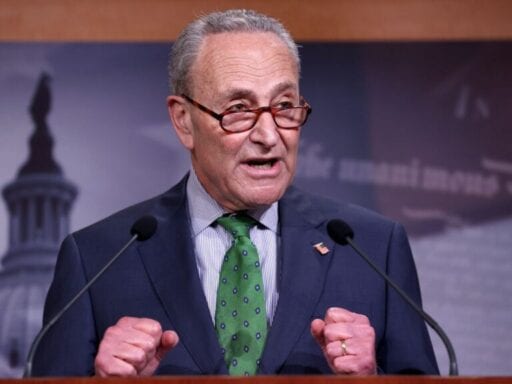He’s calling on Mitch McConnell to move more quickly on the next bill — which isn’t expected to come until July.
If statements from Senate Republicans are any indication, the timeline for the next stimulus package just keeps on slipping.
While lawmakers had previously argued that it could get done before the Senate leaves for a July Fourth recess, several have since said that’s no longer likely. “End of July … is frankly my sense of when I think we’ll have all the information we need to put the next bill together,” Sen. Roy Blunt (R-MO) told Politico this week.
Senate Minority Leader Chuck Schumer, in a letter provided exclusively to Vox, is urging Majority Leader Mitch McConnell and President Donald Trump to move more quickly on the stimulus package — and highlighting how these delays could disproportionately hurt black Americans.
Specifically, Schumer emphasizes the lag in considering the HEROES Act, a $3 trillion bill the House passed in mid-May that would provide additional funds to states and cities facing huge deficits, and guarantee hazard pay for essential workers, among other provisions.
These delays will disproportionately hurt black Americans, Schumer writes: Data on both the coronavirus and economy has found that communities of color have been hit harder by Covid-19 fatalities and business closures in recent months. (Black Americans have died from the coronavirus at nearly three times the rate of white people, the Guardian reports, in part, because of systemic disparities in the health care system, and the fact that they’re far more likely to have “essential” jobs.)
It may seem like a stretch to connect the HEROES Act to the recent protests against police brutality, but congressional inaction on the economy is also about to coincide with the asks of the Black Lives Matter protests in a very real way all too soon. Without federal support, state and local governments are set to face massive spending cuts, as they face increasing pressure to cut police budgets rather than slash social services.
Republican arguments for the stimulus delays include concerns that some of the funds in previous bills have yet to be distributed and a stronger than expected recent jobs report. (Despite gains documented in the report, the unemployment rate is still at 13.3 percent, a high that hasn’t been reached since the Great Depression, and millions are still filing for new claims.)
Timing for the stimulus package matters, because programs that were included in earlier bills — like the boost in pandemic unemployment — are due to sunset at the end of July. As a result, the pressure to get something done is only growing as many workers and businesses continue to struggle with the economic fallout of the pandemic.
“Without immediate and comprehensive action by Republicans on additional COVID-19 legislation, communities of color and millions of working Americans are going to needlessly suffer and our efforts to rebuild and foster an equitable recovery of the American economy will also fall woefully short,” Schumer writes.
Schumer calls out key provisions of the HEROES Act
In the letter, Schumer outlines a couple of different areas where additional stimulus could help address racial disparities in coronavirus testing and contact tracing, as well as economic support.
The HEROES Act would provide hazard pay of up to $10,000 for essential workers, 41 percent of whom are people of color. Additionally, it would allocate $1 billion to Community Development Financial Institutions, which have a track record of lending to black business owners, many of whom have been shut out of the earlier stimulus offered via the Paycheck Protection Program.
It would also provide $75 billion for coronavirus testing and contact tracing, aimed specifically at addressing existing racial inequities around access to such resources.
Lack of stimulus for states and cities will likely force budget cuts
The delay on the stimulus also coincides with a key aim protesters have been pushing in their demonstrations against the police killing of George Floyd.
Because Congress hasn’t greenlit additional support for state and local governments — more than $900 billion of which is included in the HEROES Act — these localities will have to consider budget cuts to key services. While local leaders have targeted areas like K-12 education in the past, the pressure from protesters and the momentum they’ve generated could mean that cuts to police will be on the table.
As Peter Beinart writes for the Atlantic, cities might be forced to consider defunding the police as they weigh how to respond to revenue shortfalls.
At this point, the Senate is poised to leave for two weeks at the start of July — and it’s looking like more action on stimulus won’t happen until they return.
Support Vox’s explanatory journalism
Every day at Vox, we aim to answer your most important questions and provide you, and our audience around the world, with information that has the power to save lives. Our mission has never been more vital than it is in this moment: to empower you through understanding. Vox’s work is reaching more people than ever, but our distinctive brand of explanatory journalism takes resources — particularly during a pandemic and an economic downturn. Your financial contribution will not constitute a donation, but it will enable our staff to continue to offer free articles, videos, and podcasts at the quality and volume that this moment requires. Please consider making a contribution to Vox today.
Author: Li Zhou
Read More



